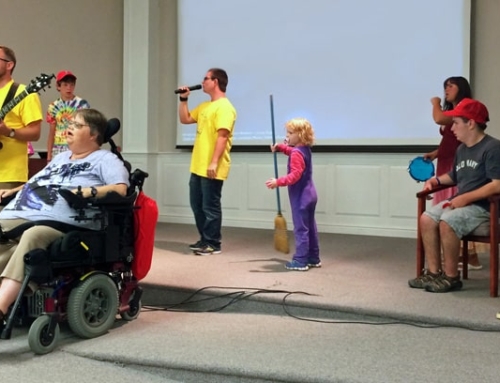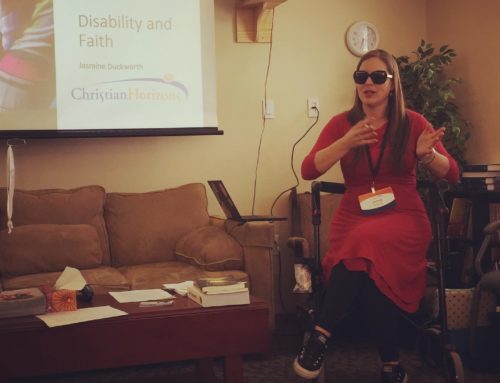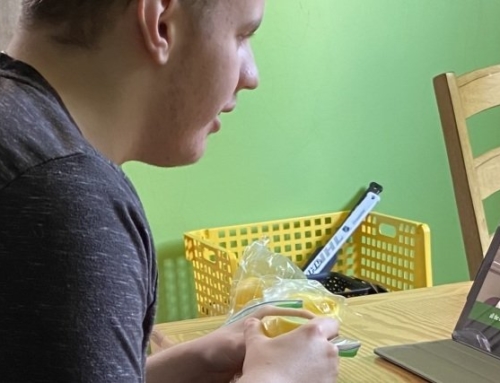I recently had a conversation with another pastor about autism and the church. There is a family with two children with autism that attend his church.
We need to stop right there and give thanks. I know, as a parent of two children with autism, that it is much easier to just stay home. The fact that this family attends church regularly is already a “win.”
One of the children at my friend’s church is fairly mellow but the other can become upset quite quickly. On a recent Sunday, this child screamed very loudly for much of the service. The pastor really struggled to be heard over the child.
Hearing this story, I had two reactions.
First, as an autism dad, it is important to me that people with autism or any other disability be welcome in every church. Children with autism are likely to make some noise and that may be the price for being a welcoming church. Sometimes this noise is simply a sign that the child is engaging in the worship service, and this reminds others that it’s okay to be engaged as well!
But I am also a pastor of a local church. My role is to teach the Bible and to encourage people in their faith. This includes, but is not limited to, the family with autism. There is a problem if the rest of the congregation cannot learn because of significant disruption.
There are no easy answers. My son has been known to make noise in church. Most of the time it is just humming but there are exceptions.
Once, when I was not a pastor but was attending church with my family, my son said in the middle of the service, “Just kill me now!”
In the church where I currently pastor, there is a young man with autism that makes some noise. I always know when he is joining us for worship. But the noise he makes is never a barrier to the worship for the rest of the congregation.
Generally, parents of children (with or without a disability) who are making a loud and ongoing noise that a pastor has to yell over know to remove them from the situation. However, this is not always the case.
Pastoral staff must have open, honest and sensitive communication with the parents. If it is a one-time, loud disruption from the child, the church should move on. These things happen. But if it is an ongoing situation that is affecting ministry to the rest of the congregation, some discussion must take place.
In speaking to the parents, please remember that they are showing tremendous courage by even making the effort to attend church.
If the parents suspect that you see their child as a disruption and not an important part of God’s family, damage will be done. Before this conversation ever takes place, the church (not just the pastor) need to invest in the family and to demonstrate their love toward each member. It is only in the context of a caring and mutual relationship that an outcome can be achieved that will benefit the entire congregation.
 Stephen J. Bedard is a pastor at Queen Street Baptist Church, adjunct faculty with Emmanuel Bible College and Chaplain at The Lorne Scots. Stephen has his BBA from Brock University along with MDiv, MTh and MA degrees from McMaster Divinity College. He is currently completing his DMin from Acadia Divinity College. He lives with his wife Amanda in St. Catherines, Ontario. Their oldest two children have autism and live in a group home setting. We have previously featured Stephen on the post The Church, Autism and Apologetics and Ministering With Autism. Steve was a workshop presenter at Christian Horizons’ Building Communities of Belonging Conference. Feel free to check out his website at www.stephenjbedard.com, pick or up a copy of his book How to Make Your Church Autism Friendly.
Stephen J. Bedard is a pastor at Queen Street Baptist Church, adjunct faculty with Emmanuel Bible College and Chaplain at The Lorne Scots. Stephen has his BBA from Brock University along with MDiv, MTh and MA degrees from McMaster Divinity College. He is currently completing his DMin from Acadia Divinity College. He lives with his wife Amanda in St. Catherines, Ontario. Their oldest two children have autism and live in a group home setting. We have previously featured Stephen on the post The Church, Autism and Apologetics and Ministering With Autism. Steve was a workshop presenter at Christian Horizons’ Building Communities of Belonging Conference. Feel free to check out his website at www.stephenjbedard.com, pick or up a copy of his book How to Make Your Church Autism Friendly.


